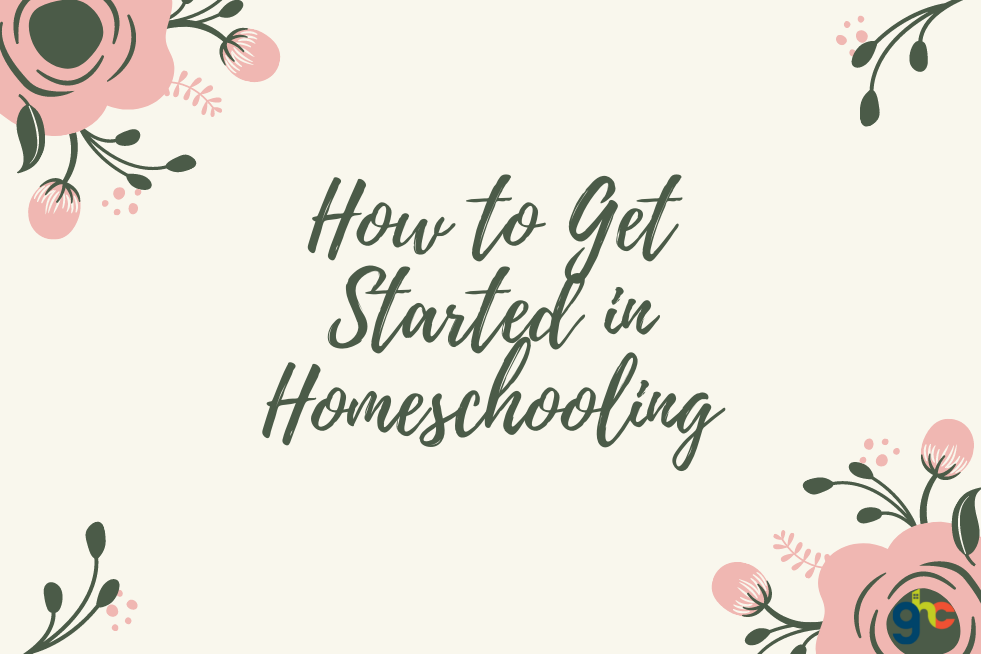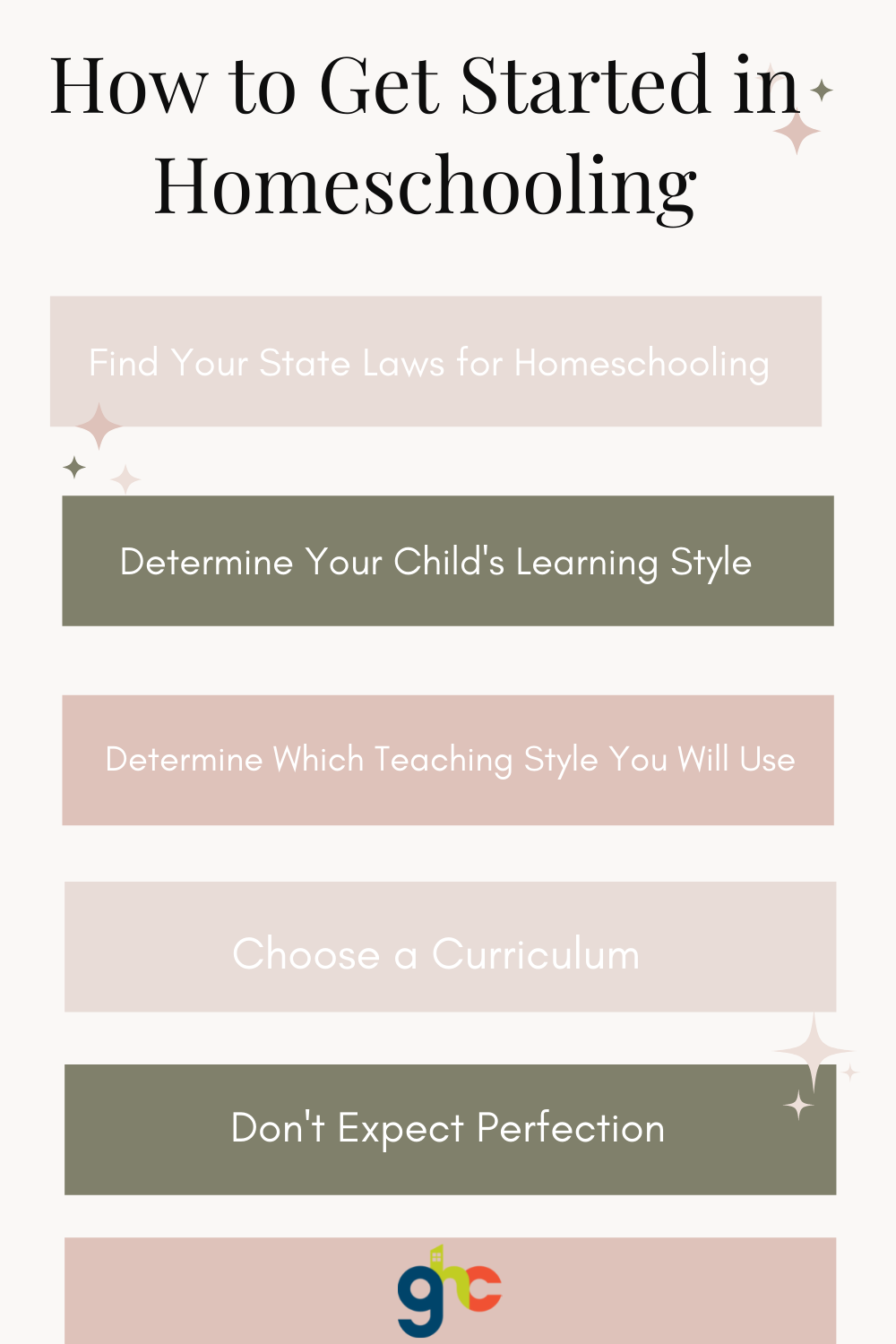
How to get started in homeschooling. It's a question many have asked when thinking about their child's education. Making the choice to start homeschooling your child or children is always the best choice. Not only does it give you the freedom to tailor their specific academic program to their strengths and style of learning, but it gives you so much freedom as well. There are MANY advantages to this endeavor, and you’ll find them all as well as some of your own as you move along this path with your child. Your homeschool journey will give you the opportunity to create your own schedule and go at your own pace, to include religious study in your child’s academic structure, to be a part of a larger homeschool community, and to be able to change things if you find that something simply doesn’t work.
So how do you get started in homeschooling? I’m glad you asked! It’s not nearly so daunting a task as it seems, especially if you’re a first-year homeschooler, so that’s the good news. You’ll have to consider a great deal of information, find the legal requirements for your state, and be ready and willing to bend and grow as your child does. What works in first grade will certainly need to be changed only a few short years later, no matter what style, method, or curriculum you start with. Not everything will change, but there will be much that does. And you just want to be prepared for that along the way.
Steps for How to Get Started in Homeschooling
Step #1: Find Your State Laws for Homeschooling
This is a very crucial step and without it, you won’t be able to move forward. Each state has its own set of homeschool laws, and new homeschoolers will have to adhere to their own state requirements. While most homeschool parents go an entire 12 years of homeschooling without ever having to produce proof that they are adhering to these laws, it still happens. And if you are ever asked to provide that proof, you need to know exactly what is expected.
With respect to homeschooling laws, it’s not a bad idea at all to stay up to date with the latest homeschooling news, federal and state homeschooling legislation, and specific homeschool cases, most often involving the HSLDA (Homeschool Legal Defense Association) and other prominent firms, that are being heard in the courts. The reason you want to stay abreast of this news is that today’s news and court cases could give way to tomorrow’s laws, many of which threaten to infringe on your God-given right to homeschool in some of the most preposterous ways.
As homeschoolers, we need to make sure we make our voices heard, loud and clear, in support of those rights. If we find out our rights are threatened, we can take action by calling or writing our representatives and sharing the news with other homeschoolers and homeschooling groups in which we might be involved.
There are some special considerations for these homeschool laws that you should be aware of as well. For example, laws regarding homeschooling in the military can be very confusing. If you are in the military and homeschool or are thinking about starting to homeschool, please familiarize yourself with some very important information that can be found HERE.
Step #2: Determine Your Child’s Learning Style
Every child learns differently. Understanding how your own child learns can make the difference between a great homeschooling experience or a really bad one. More importantly, teaching according to your child’s specific learning style means that your child is more likely to retain the information taught. They might even learn more quickly giving them great opportunities for academic advancement.
Learning styles vary greatly from child to child, but can include the following:
- Visual Learners: Prefer charts, diagrams, patterns, shapes, and artistic activities
- Auditory Learners: Prefer talking, singing, rhymes, and music.
- Reading & Writing Learners: Prefer reading and writing, keeping lists, categorizing information, and taking notes.
- Kinesthetic Learners: Prefer to utilize all senses by hand-on learning, videos, field trips, demonstrations, and trial and error.
- Logical-Mathematical Learners: Prefer order, logic, numbers, organization, computers, and projects that have a clear, concise goal.
- Social Learners: Can exist in tandem with other learning styles and these learners prefer role-playing, group work, discussion, interaction, and leadership.
- Solitary Learners: Prefer to work on their own making use of reading, writing, workbooks, and setting their own personal goals.
For more information on how to work with and homeschool your child according to their own learning style, CLICK HERE.
Step #3: Determine Which Teaching Style You Will Use
After determining which learning style best suits your child, you can then move on to a teaching style that will best match that. Your teaching style as an educator should go hand in hand with your child's learning style to create an excellent and beneficial homeschool setting in which it’s not only easy to learn, but also easy to teach. It won’t take long to find out if you’re teaching in a style that is completely unrelated to your child’s learning style, because things will feel forced and progress is slow-going if it’s even made at all.
There are many different homeschool teaching styles. Some are very strict and rigid, while others are lenient and laid-back, but if paired correctly with the learning style, you’ll see excellent results. Here are some of the most common homeschooling styles:
- Eclectic Homeschooling: Eclectic homeschoolers tend to pick and choose from a variety of different curriculum options to find what best works for their child. This can include borrowing from other homeschooling styles as well, such as mingling The Charlotte Mason Method with Unschooling.
- Traditional Homeschooling: This style is modeled very closely after the way a traditional school day is lined up, although there is usually a great difference in the subject matter taught. For instance, a specific boxed curriculum is utilized, a schedule is put in place, usually to include lunch and recess, and very little adaptation is allowed.
- Unit Studies Homeschooling: Unit studies allow the use of a single theme across every subject matter covered. Lapbooks are often included and many various resources can be used including television programs and video clips, field trips, fiction books, and hands-on learning.
- Montessori Homeschooling: The Montessori Method is often thought to be too complex for parents to utilize with their children in a homeschool setting. Some parents still choose this homeschooling style for its dedication to learning in specific stages, focusing on the arts, and using Living Books as a curriculum.
- Classical Homeschooling: Often referred to as an “ancient” technique, this style focuses on the Latin language for solidifying the concept of logic. It also utilizes a more rigid curriculum base for mastery across subjects.
- Unschooling: This very loose, child-led homeschooling style allows for the most personalization, borrowing from different styles, especially Unit Studies, as well as allowing for a great deal of learning based on the interests and hobbies of the child. Though this teaching style is probably the hardest to keep records for, there are lots of resources on how to do so.
- Charlotte Mason Homeschooling: There is no strict curriculum available for the Charlotte Mason homeschooling style, as it focuses on a wide variety of life lessons, living books, and personal experience to create a well-rounded person. Children are expected to know certain things at certain age levels, with oral narration playing a key part in the early learning experience.
For more detailed information on finding your own homeschooling style, CLICK HERE.
Step #4: Choose A Winning Curriculum
Although not all homeschool teaching styles necessitate a full curriculum, even those using the methods such as Unschooling or Eclectic homeschooling utilize some type of resource. Even if you don’t purchase the full curriculum for your home education experience, you might choose a specific subject by a specific homeschool provider. For instance, you could pick a math resource from Abeka while using Sonlight for another subject or two. There are certainly no rules for curriculum choices, and you are free to combine as you see fit. The most important thing is that whatever you choose works for both you and your child throughout the school year.
There are many different places online where you can browse homeschool literature titles, textbook details, and more, but nothing takes the place of actually getting your hands on the materials you think will be the most useful. Attending one of our Great Homeschool Conventions is an excellent way to do this, as we have extensive homeschool curriculum providers set up with products you can touch, flip through, and examine at your discretion until you find the perfect fit. What’s more, you can purchase many of these items on the spot, as well as other resources you might find and fall in love with.
Even better, by attending one of our Great Homeschool Conventions, you’ll be able to meet other homeschooling parents who may have already used the curriculum you are considering. They can provide you with details and opinions that might solidify your decision, or cause you to move on to something else entirely. This is something you’re not likely to find online outside of reviews. And these days, many reviews are bought and paid for by the company selling the product.
Step #5: Do NOT Expect Perfection
As you embark on your homeschooling journey with your new homeschooling curriculum and your newfound confidence, don’t be surprised if some things simply don’t work. If you’re a new homeschool mom, it’s important that you do not expect a perfect experience. Chances are, you’ll find out what works and what doesn’t only as you move through your program of choice. This is perfectly acceptable and is actually one of the benefits of homeschooling.
If your child starts a local school, for instance, and simply isn’t doing well with the material being taught, or the method used to teach that material, there’s absolutely nothing you can do. In homeschool, that same situation allows you to switch curriculum options, even mid-year if necessary, to implement a different schedule, or take a different approach to new and more difficult information. It might seem like “time wasted” to those who don’t understand. The good news is that in homeschooling, once you find out what works well, it’s much easier to catch up on any work you might have missed.
For those who experience problems that don’t seem to go away no matter what you change, a co-op or support group might be a good resource to take advantage of. I promise you are NOT the only parent who has ever considered throwing in the towel on homeschooling! In fact, I think we all have at one time or another, especially in the beginning. It’s important to remember that it’s new territory, and along with that comes a certain amount of learning. Give your child - and yourself - some room for growth.

In Closing
Getting started in homeschooling really isn’t that hard, as you can now see. There are certain factors that come into play at specific times and the better prepared you are for that, the more successful you will be in planning your homeschooling year. Even if you’re a seasoned homeschooler, new curriculum options or other resources could change your whole game plan, making it even easier for everyone.
Attending one of our seven regional Great Homeschooling Conventions is a great way to gather just about every resource you could possibly need. It’s also a great way to gain knowledge and talk with others who have something important to offer. We offer special speakers, workshops, curriculum vendors, and so much more, you’ll definitely find something that works for you. You’ll also get to meet and speak with other homeschoolers just like you. Depending on what stage of homeschooling you’re in, you can either glean knowledge from them or contribute from the wealth of your own personal experiences.
Since people attend these regional conventions from all over the United States, we offer specials on things that really matter. You’ll receive hotel discounts and some can take advantage of our military discounts and free admission for active clergy.
To see a list of our upcoming Convention locations, CLICK HERE.
To register, CLICK HERE.
To read additional blog content, CLICK HERE.
And remember, Great Homeschool Conventions are: Equipping… Encouraging… FUN!
